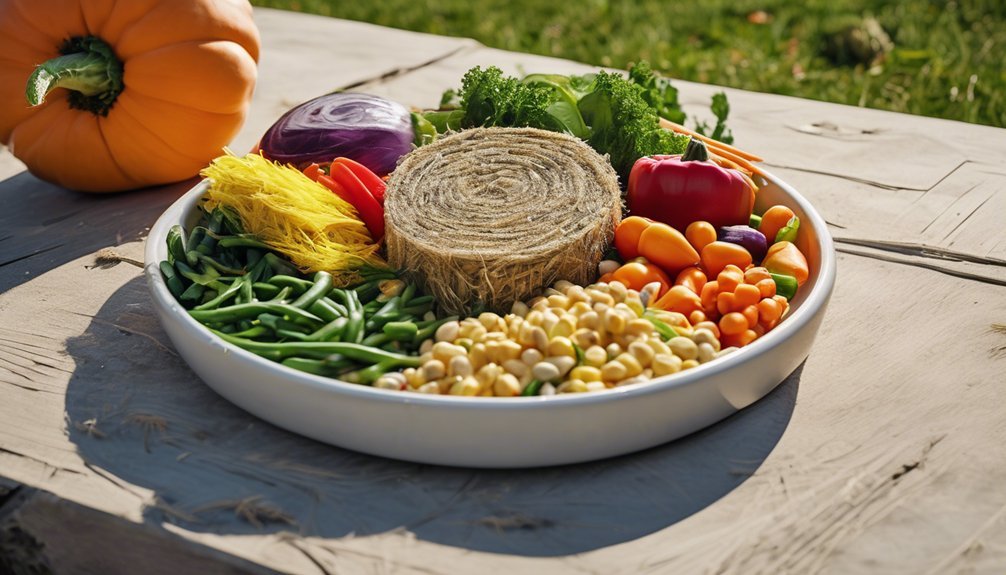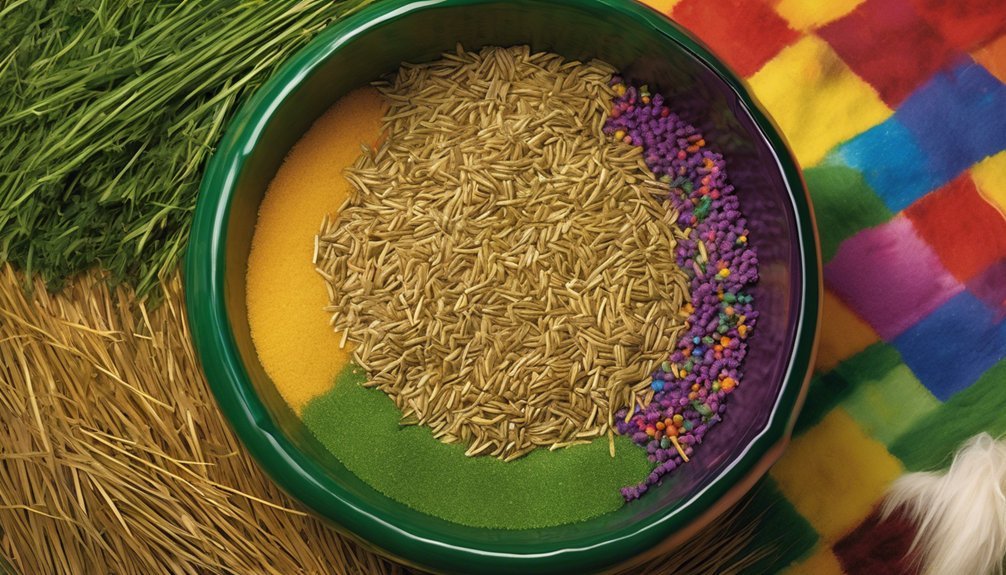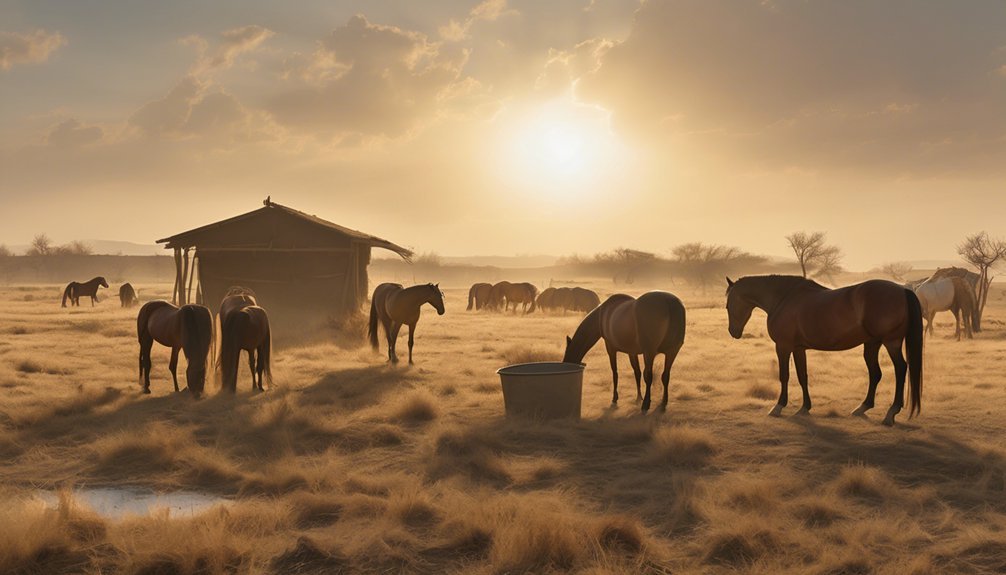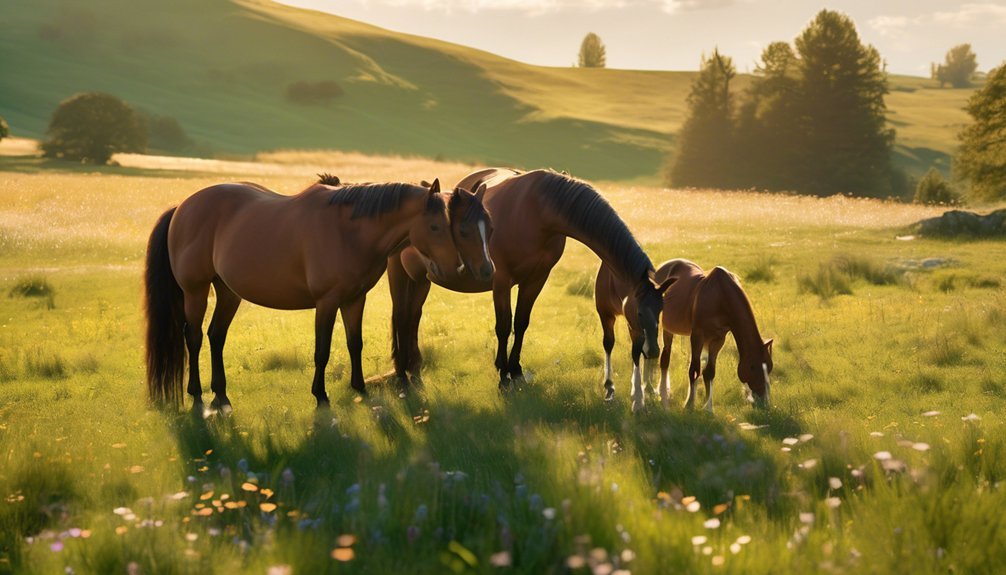
Balancing fiber, protein, and carbohydrates in your horse's diet is crucial for their health and performance. Fiber supports digestion and gut health, while protein is essential for muscle development and repair. Carbohydrates provide the energy necessary for endurance and activity. Understanding how to properly balance these nutrients can significantly impact your horse's well-being. But how do you assess their specific needs and create the ideal diet?
Key Takeaways
- Ensure high-fiber forage is the primary component of the diet to support digestion and gut health.
- Incorporate quality protein sources like alfalfa and soybean meal for muscle development and tissue repair.
- Balance carbohydrates by mixing grains and forage to provide both immediate and sustained energy.
- Regularly assess caloric needs based on the horse's age, weight, and activity level for optimal diet formulation.
- Establish consistent feeding schedules to promote digestive stability and prevent disturbances.
Understanding the Nutritional Needs of Horses

Understanding the nutritional needs of horses is crucial for their overall health and performance. You need to be aware that nutritional deficiencies can significantly hinder equine metabolism, affecting everything from energy levels to immune function.
Horses require a balanced diet rich in essential vitamins, minerals, and macronutrients. Each horse is unique, with age, activity level, and health status influencing their specific requirements. For instance, a performance horse may need higher protein and fat levels to support muscle development and stamina.
Regularly assessing your horse's diet can help you identify any gaps that may lead to deficiencies. By ensuring they receive the right nutrients, you'll promote optimal health and enhance their performance, creating a strong bond built on mutual well-being.
The Importance of Fiber in a Horse's Diet
Fiber plays a critical role in a horse's diet, as it aids digestion and maintains gut health.
When you provide your horse with adequate fiber, you support efficient fiber digestion, which is crucial for nutrient absorption.
Horses are naturally designed to consume fibrous materials, and a lack of fiber can lead to digestive disturbances like colic or laminitis.
Protein: Building Blocks for Health and Performance

While fiber is vital for gut health, protein serves as the backbone for a horse's overall health and athletic performance.
It's essential for muscle development, tissue repair, and the production of enzymes and hormones. When considering protein sources, prioritize high-quality options like alfalfa, soybean meal, and oats, which provide the necessary amino acids.
Achieving dietary balance is crucial; too little protein can hinder muscle growth and recovery, while excess can strain the kidneys. Always tailor your horse's diet to its specific needs, factoring in age, activity level, and overall health.
Carbohydrates: Fueling Energy and Endurance
Carbohydrates play a crucial role in your horse's diet, serving as the primary source of energy needed for daily activities and athletic performance. They break down into simple sugars, providing immediate energy, while complex carbohydrates offer sustained fuel, which is essential during endurance training.
By including a mix of energy sources, such as grains and forage, you ensure your horse has the stamina to perform optimally.
Balancing these carbohydrates is vital; too few can lead to fatigue and reduced performance, while too many can cause digestive issues. Understanding your horse's specific needs and activity level will help you tailor carbohydrate intake effectively, promoting peak performance and overall health.
Prioritizing this balance can enhance your horse's energy and endurance on the trail or in the arena.
Assessing Your Horse's Dietary Requirements

Understanding your horse's energy needs is just the beginning of creating a well-rounded diet. To ensure your equine friend thrives, a thorough dietary assessment is essential.
Start by evaluating their age, weight, activity level, and overall health. These factors help determine their specific nutritional requirements. Conducting a nutritional evaluation allows you to identify any deficiencies or excesses in fiber, protein, and carbohydrates.
Pay attention to how your horse responds to their current diet, as changes in behavior or performance can signal dietary adjustments are needed. Remember, individual horses have unique needs, so regular assessments keep their diet balanced and promote optimal health.
Tailoring their nutrition is key to supporting their energy, endurance, and overall well-being.
Common Sources of Fiber, Protein, and Carbohydrates
When choosing the right ingredients for your horse's diet, it's crucial to identify common sources of fiber, protein, and carbohydrates that meet their nutritional needs. Understanding these sources will help you create a balanced diet.
| Nutrient | Common Sources |
|---|---|
| Fiber | Hay varieties (timothy, alfalfa) |
| Protein | Grain types (oats, barley) |
| Carbohydrates | Vegetable sources (carrots, beet pulp) |
| Forage Options | Pasture grasses |
| Mixed Feeds | Complete feeds (pellets, cubes) |
Incorporating these elements can enhance your horse's health, performance, and overall well-being. By selecting high-quality hay varieties and grain types, along with beneficial vegetable sources and forage options, you'll ensure your horse thrives.
Tips for Creating a Balanced Diet

To create a balanced diet for your horse, focus on the right proportions of fiber, protein, and carbohydrates, as these nutrients play vital roles in their overall health.
Start by assessing your horse's caloric intake needs based on their age, weight, and activity level.
Consider these tips for a well-rounded diet:
- Choose high-fiber forage: Ensure your horse's primary food source is hay or pasture to support digestive health.
- Incorporate quality protein: Add protein-rich feeds, like alfalfa or soybean meal, to meet their muscle and repair needs.
- Establish consistent feeding schedules: Regular feeding times help maintain digestive stability and nutrient absorption.
Monitoring Your Horse's Condition and Adjusting Diet
Monitoring your horse's condition is crucial for ensuring their diet meets their evolving needs. Regular health monitoring allows you to assess factors like weight, coat condition, and energy levels, which are indicators of nutritional adequacy.
If you notice any changes—such as unexpected weight gain or loss—you'll need to make diet adjustments accordingly. For instance, increasing fiber can help if your horse is too thin, while reducing high-starch grains may be necessary for those gaining weight.
Always observe how your horse responds to dietary changes, and consult with an equine nutritionist if you're unsure. By staying attuned to your horse's health, you can create a balanced diet that supports their well-being and performance.
The Role of Supplements in Equine Nutrition

While a balanced diet forms the foundation of your horse's nutrition, supplements can play a vital role in addressing specific nutritional gaps and enhancing overall health.
Understanding different supplement types can help you optimize your horse's well-being:
- Vitamins and minerals: Essential for metabolic functions and immune support.
- Probiotics: Aid in digestion and improve nutrient absorption, promoting gut health.
- Fatty acids: Support coat condition and joint mobility.
Frequently Asked Questions
Can Horses Digest Grains Effectively?
Horses can digest grains, but their equine metabolism processes them differently than other feed. You'll want to monitor their intake, as excessive grain can lead to digestive issues, highlighting the importance of balanced nutrition in their diet.
How Do I Recognize Fiber Deficiency in My Horse?
You'll notice signs of fiber deficiency when your horse has poor digestive health. Look for decreased manure quality, weight loss, or lethargy. Ensuring ample fiber sources like hay can help maintain their overall well-being.
What Are Signs of Protein Excess in a Horse's Diet?
You'll notice protein toxicity in your horse through excess symptoms like weight loss, lethargy, and excessive urination. Monitoring your horse's diet closely helps prevent these issues and ensures their overall health and well-being.
Are There Specific Carbs to Avoid for Certain Horses?
Certain carb sources, like sugars and starches, can negatively impact horses with metabolic issues. Following dietary guidelines tailored to your horse's needs ensures better health, enhancing performance while avoiding unwanted risks associated with inappropriate carbohydrate intake.
How Often Should I Feed My Horse Throughout the Day?
To keep your horse feeling its best, aim for feeding frequency of three to four meals daily. Splitting larger meal portions helps maintain energy levels and promotes digestion, ensuring your companion thrives happily throughout the day.
Conclusion
In conclusion, crafting a carefully balanced diet for your horse—focused on fiber, protein, and carbohydrates—ensures optimal health and performance. By prioritizing proper proportions, you promote peak performance and prevent potential pitfalls. Regularly reassessing your horse's unique needs and making mindful modifications will help maintain their well-being. Remember, a well-nourished horse is a happy horse, thriving through tailored nutrition and dedicated diligence in dietary decisions. Your commitment to their care can create a champion companion.





